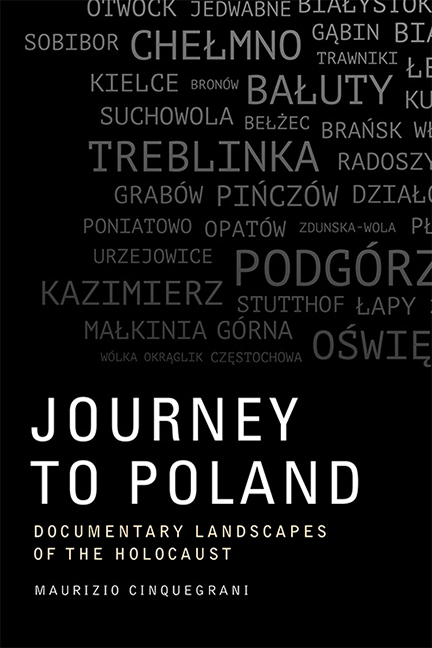Book contents
- Frontmatter
- Contents
- List of Figures
- Acknowledgements
- Dedication
- Prologue: Space, Time and the Holocaust
- 1 Countryside, Shtetl, City: The Murders of Mazovia, Jedwabne and Kielce
- 2 Conflicting Memories in the Shtetlekh Gąbin, Suchowola, Brańsk and Luboml
- 3 The Marketplaces of Postmemory in the Shtetlekh Eishyshok, Delatyn, Opatów, Zdunska Wola, Urzejowice and Pińczów
- 4 A Tale of Two Cities: Warsaw and Kraków
- 5 Another Tale of Two Cities: Lviv and Łódź
- 6 A Tale of Two Cities of Death: Treblinka and Oświęcim
- Epilogue: New Routes
- Bibliography
- Filmography
- Index
1 - Countryside, Shtetl, City: The Murders of Mazovia, Jedwabne and Kielce
Published online by Cambridge University Press: 10 November 2020
- Frontmatter
- Contents
- List of Figures
- Acknowledgements
- Dedication
- Prologue: Space, Time and the Holocaust
- 1 Countryside, Shtetl, City: The Murders of Mazovia, Jedwabne and Kielce
- 2 Conflicting Memories in the Shtetlekh Gąbin, Suchowola, Brańsk and Luboml
- 3 The Marketplaces of Postmemory in the Shtetlekh Eishyshok, Delatyn, Opatów, Zdunska Wola, Urzejowice and Pińczów
- 4 A Tale of Two Cities: Warsaw and Kraków
- 5 Another Tale of Two Cities: Lviv and Łódź
- 6 A Tale of Two Cities of Death: Treblinka and Oświęcim
- Epilogue: New Routes
- Bibliography
- Filmography
- Index
Summary
‘I remember a lane leading to the house where we lived.’
— Henryk Grynberg, BirthplaceAn old Jewish man named Jurek returns to his shtetl Otwock, in central Poland, wanders in the dilapidated Jewish cemetery at sunset and walks the empty streets of the village, a place at once familiar and yet profoundly alien (Fig. 1.1). This sequence from Małgorzata Imielska's Powiedz mi, dlaczego (Tell Me Why, 2005) captures a landscape that is emblematic of the destinations of many Holocaust survivors’ return journeys to Eastern Europe and of their cinematic image in documentary films. Tell Me Why is based on interviews with Jurek and Stella, two survivors who fell in love in 1936 in Otwock and were then separated by the war. Jurek was deported to Auschwitz II-Birkenau and later settled in Israel, while Stella was taken to a labour camp in Germany and then moved to the United States. In 2005, following the recent deaths of their spouses, Jurek suggested they should meet again. The location for this reunion was planned to be the shtetl of Otwock, where Jurek returned after more than sixty years while Stella decided to stay in Boston. Despite the unsuccessful attempt to reunite Jurek and Stella, Tell Me Why uses the site of the shtetl to unlock painful and yet nostalgic memories of pre-war Jewish life, with that ambivalent retrospective look at ancestral locations that characterises the cinematic landscapes of the life and death of the Jews of Poland. In documentaries of return, the transgenerational communication of knowledge is part of a process aimed at filling absences, deciphering flashes of memory, and assessing the conformity of present-day spaces to the recollections of the survivors. These films also define the old shtetlekh, their streets, marketplaces, buildings and cemeteries, as cultural paradigms for the transactions of memory from the survivors to the second and third generations and as selected sites for various attempts of reconciliation between Jews and Poles. Additionally, recent documentaries have given Polish witnesses the responsibility of conveying memories of pre-war Jewish communities and their destruction.
- Type
- Chapter
- Information
- Journey to PolandDocumentary Landscapes of the Holocaust, pp. 21 - 38Publisher: Edinburgh University PressPrint publication year: 2018



